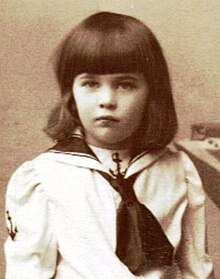| Assen Hartenau | |
|---|---|
| Count of Hartenau | |
 Assen Hartenau in 1894 (aged 3–4) | |
| Born | 16 January 1890 Graz, Austria-Hungary |
| Died | 15 March 1965 (aged 75) Vienna, Austria |
| Spouse | Bertha Hussa-Lamos |
| Issue | Wilhelm Hartenau (adopted) |
| House | Battenberg |
| Father | Alexander of Battenberg |
| Mother | Johanna Loisinger |
Assen or Asen Hartenau [a] (16 January 1890 – 15 March 1965), in his early life styled as the Count of Hartenau, was an Austrian civil servant and the son of the deposed Bulgarian prince Alexander of Battenberg ( r. 1879–1886).
Biography
Early life
Assen Hartenau was born in Graz [3] on 16 January 1890, [1] [4] the son and eldest child of Alexander of Battenberg, deposed Prince of Bulgaria ( r. 1879–1886), and his wife Johanna Loisinger, an actress and singer. [4] He was named after the medieval Bulgarian ruler Ivan Asen I ( r. 1188–1196), [4] [5] co-founder of the Second Bulgarian Empire (1185–1422). [5] The name thus served to underline the claims of Alexander and his family to the Bulgarian throne. [5]
Hartenau had a younger sister, Svetana (1893–1935). [2] [4] After Alexander's early death in 1893, [4] Johanna and the children moved to Vienna. The family was in exile provided with a yearly pension of 50,000 leva by the Bulgarian government. [2] [6] Following Alexander's deposition and marriage to Johanna, he had styled himself as the Count of Hartenau, [7] a title inherited by Assen. [4]
Career
Hartenau studied law at the University of Graz [8] and eventually became a Doctor of Law. [2] He eventually dropped the title of count and became an Austrian civil servant. [4] Through his life he held various important financial and political positions in Austria. [2] [8] He was employed in the Ministry of Finance from 1919 to 1922 and served as a diplomat in Paris from 1922 to 1928, mainly overseeing payment of war reparations. [2] In 1938, Hartenau was made the State Commissioner of the Oesterreichische Nationalbank. [9] He played an important role in settling the Austrian national debt in the 1940s. [10]
After World War II (1939–1945), Hartenau was deemed to have been "politically indifferent" during the war. [10] From 1951 to 1953, he served as the financial director of Zellwolle Lenzing AG. [2] Hartenau died in Vienna [11] on 15 March 1965. [2] [11]
Personal life
Hartenau married Bertha Hussa-Lamos (1892–1971) on 7 May [2] 1934. [4] The couple did not have any children together, [2] though Hartenau adopted Hussa-Lamos's son Wilhelm (from a previous marriage), who thus became Wilhelm Hartenau (1915–1991). [2] [4] Wilhelm was a physician in Vienna and had three children of his own; Alexander, Elizabeth and Francisca, [4] regarded as the heirs of Alexander of Battenberg. [2] [12] [b]
During the reign of Alexander's successor in Bulgaria, Ferdinand I ( r. 1887–1918), the Bulgarian press sometimes highlighted Hartenau as a legitimate possible rival contender for the throne, styling him as "Prince" and as "His Highness". [13]
Notes
- ^ Different sources ascribe Hartenau slightly different full names. Two variants are Louis Alexander Assen, Count of Hartenau [1] and Krum Asen Louis Alexander von Hartenau. [2]
- ^ Given that Hartenau's sister Svetana did not have any biological children either, Alexander of Battenberg otherwise has no living descendants. [2]
References
- ^ a b Annuaire de la noblesse de France et des maisons souveraines de l'Europe (in French). Bureau de la publication. 1896. p. 77.
- ^ a b c d e f g h i j k l m Stoyanovich, Peter (2022). Das Interregnum, die Bulgarische Krise und der Kampf um den Thron (1886 - 1887) (in German). LIT Verlag Münster. p. 103. ISBN 978-3-643-91232-9.
- ^ British Documents on Foreign Affairs--reports and Papers from the Foreign Office Confidential Print: Austria, Scandinavia and Western Europe, January 1949-December 1949. University Publications of America. 2002. p. 56. ISBN 978-1-55655-769-9.
- ^ a b c d e f g h i j Cookridge, E. H. (1968). From Battenberg to Mountbatten. John Day Company. pp. 102–103.
- ^ a b c Oroschakoff, Haralampi G. (2007). Die Battenberg-Affäre: Leben und Abenteuer des Gawriil Oroschakow, oder, Eine russische-europäische Geschichte (in German). Berlin-Verlag. p. 451. ISBN 978-3-8270-0705-6.
- ^ Richard von Mach: Aus bewegter Balkanzeit 1879–1918. Mittler, Berlin 1928, p. 52.
- ^ Röhl, John C. G. (2004). Wilhelm II: The Kaiser's Personal Monarchy, 1888-1900. Cambridge University Press. p. 122. ISBN 978-0-521-81920-6.
- ^ a b Gertrude Enderle-Burcel, Michaela Follner (Hrsg.): Diener vieler Herren. Dokumentationsarchiv des Österreichischen Widerstandes, Wien 1997, ISBN 3-901142-32-0, p. 159. Rudolf Neck, Adam Wandruszka, Isabella Ackerl (Hrsg.): Protokolle des Ministerrates der Ersten Republik, 1918–1938. Band 9, Teil 2. Verlag der Österreichischen Staatsdruckerei, Wien 1986, ISBN 3-7046-0060-1, p. 631.
- ^ United States Army Service Forces (1943). Civil Affairs Handbook: Money and banking. Army Service Forces. p. 23.
- ^ a b Fritz, Wolfgang (2011). Fortschritt und Barbarei: Österreichs Finanzverwaltung im Dritten Reich (in German). LIT Verlag Münster. pp. 304, 309. ISBN 978-3-643-50247-6.
- ^ a b Austria. Ministerrat (1993). Protokolle des Ministerrates der Ersten Republik, 1918-1938 (in German). Verlag der Österreichischen Staatsdruckerei. p. 631. ISBN 978-3-7046-0004-2.
- ^ Lee, Brian North (1992). British Royal Bookplates and Ex-libris of Related Families. Brookfield, Vt., USA. ISBN 978-0-85967-883-4.
- ^ Stoyanovich, Peter (2021). Zar Ferdinand I. (geb. Prinz von Sachsen-Coburg und Gotha): Seine Herkunft, Bildung, Motivation und der Aufbau des modernen Bulgarien. 1861 - 1887 - 1912 (in German). LIT Verlag Münster. p. 101. ISBN 978-3-643-91215-2.